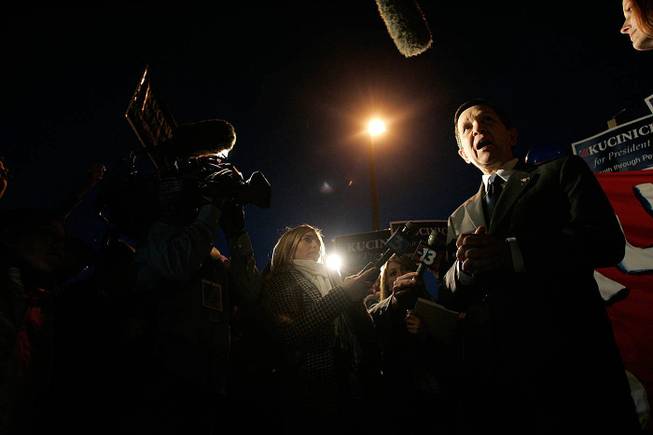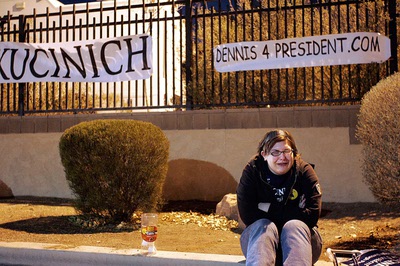
Presidential candidate Dennis Kucinich speaks to reporters outside Cashman Center after the state high court kept him out of the Democratic debate in Las Vegas.
Wednesday, Jan. 23, 2008 | 2 a.m.
Outside Support
Some of the most interesting sights and sounds of the Democratic presidential debate didn't come from Hillary Clinton, John Edwards, or Barack Obama on the inside of the Cashman Center. Instead the trio's supporters, along with a large legion of Dennis Kucinich backers, made their views, votes, and vocals known on the outside.
You Won't See This on TV
After an initial invitation, followed by an exclusion, a lawsuit and an appeal, MSNBC successfully barred Dennis Kucinich from the Democratic presidential debate in Las Vegas.
(Sun new media intern Jenna Kohler contributed to this report.)
Sun Archives
- Kumbaya (1-16-08)
- Blog: Kucinich decries GE media conspiracy
- Kucinich hard to silence, NBC learns(1-15-08)
More on Kucinich
The loser of last week’s Democratic presidential debate in Las Vegas may not have been Hillary Clinton, John Edwards or Barack Obama. It appears to be Nevada’s courts.
A District Court judge last week issued a ruling about the debate that suggested the judiciary in Nevada isn’t terribly familiar with the First Amendment. The decision opened the possibility that long-shot presidential candidate Dennis Kucinich, an Ohio congressman, could pry his way into the Jan. 15 debate.
The Nevada Supreme Court ultimately settled the issue as NBC was going through final preparations, an hour before the debate. The high court saw the issue as a simple one -- ample First Amendment precedent gives NBC or any other news organization the right to invite anyone it wants to a debate.
But by then, Nevada had taken something of a beating for the original decision, which legal scholars immediately recognized as wrong.
The dispute began when NBC decided to limit the debate to the three leading candidates. NBC had invited Kucinich to participate, then withdrew the invitation. Kucinich barely registers in opinion polls and he showed poorly in early presidential contests.
The day before the debate, Kucinich filed a lawsuit. It landed in the District Court courtroom of Judge Elizabeth Halverson, who was suspended last summer over alleged ethical lapses. That sent the case to Senior Judge Charles Thompson, who had been assigned to Halverson’s courtroom that day.
But Thompson was in a rush to get to drug court, a conflict he explained to attorneys for both sides. The hearing lasted 20 minutes. Perhaps worse, it came just 90 minutes after the suit was filed, leaving little time for review.
During the hearing, Thompson denied the network’s request to have Chuck Todd, its political director, explain NBC’s decision to change the participation criteria.
Thompson surprised legal observers when he decided NBC’s cable news channel, MSNBC, which televised the debate, had to include Kucinich. Barring Kucinich, the judge said, would be unfair to the candidate and to Nevada voters.
According to the magazine The Nation, Thompson told NBC’s attorney: “I’m somewhat offended that a legitimate candidate was invited to a debate and then uninvited under circumstances that appear to be that they just decided to exclude him.”
The state Supreme Court overturned Thompson’s decision the next day.
Constitutional scholars said Thompson’s ruling ran counter to overwhelming precedent supporting NBC.
Disinviting a candidate “is arguably rude but it’s not legally actionable,” said Steven Lichtman, a professor at Shippensburg University in Pennsylvania.
“Judge Thompson essentially tried to substitute his vision for what is fair for the network’s vision of what is newsworthy, and he’s not allowed to do that” under the First Amendment, Lichtman said.
Thompson declined to comment to the Sun.
The reason his court had little time to consider the case is familiar to the short-handed Nevada court system.
Court Administrator Chuck Short said judges at the Regional Justice Center handle 1,500 to 2,500 cases a year -- indicative of swelling caseloads countywide. “You risk jeopardizing some fundamental constitutional rights when you have assembly-line justice rather than ensuring everyone has their day in court,” Short said.
But Presiding Judge Kathy Hardcastle told the Sun on Tuesday that she did not think time played a role. “I’m sure if he felt like he needed more time, he would’ve taken it,” Hardcastle said. “He’s a very experienced judge.”


Join the Discussion:
Check this out for a full explanation of our conversion to the LiveFyre commenting system and instructions on how to sign up for an account.
Full comments policy